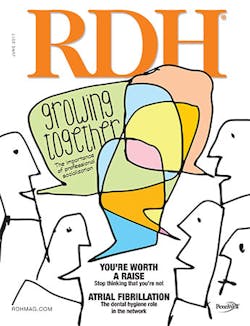Whose fault is it? When dental disease surfaces, must we always blame the patient?
By Shirley Gutkowski,RDH, BSDH
Can you imagine being blamed for a ruptured appendix? In the United States, we have become so accustomed to being blamed as a patient, as well as prone to blame as a provider, that anything outside of patient responsiblity is difficult to address.
Recently, a rash of adult patients with tongue tie brought this blame-the-patient idea to a head. It always amuses me when conditions cluster. One day no one needs x-rays; on another day, everyone does. One day everyone has cavities; on another day, no one does. Months can go by, and you never come across a restricted tongue. Suddenly, everyone has one. A restricted tongue leads to gingivitis, smaller palate, and an inability to use the tongue to chew or remove food debris from all areas of the mouth, leading to decay and periodontal inections (and more importantly leads to mouth breathing and contributes to an obstructed airway).
Here’s the problem with decay; it’s not normal, it’s common. Professional ethics are to continually recommend fillings and instruct the patient to brush better, floss more, and use more fluoride. Fluoride deficiency is not the reason for decay. Worse is blaming patients, telling them their teeth decay because they did something wrong. To be completely ethical, a practitioner should look further than the patient’s tooth brush. The tide of blame has been hitting patients for so long that when another answer comes up that removes fault from them, they don’t know how to handle the news.
Impact of no prevention
A restricted tongue is not a direct relationship to decay or periodontal disease such as biofilm accumulation. A tethered tongue is an insidious cause and under-recognized. When patients hear of their restricted tongue being the cause of the problem, they don’t know what to do about it. They lash out at the person pointing it out. Patients don’t want to feel guilty for not brushing or flossing, but they’re used to it. Being blamed is common.
Dentistry has kept people in teeth, and has lost sight of the practice of dentistry. The biological dimensions of the tooth or the arch can be repaired. There have been strides in those areas, and dentistry has lost sight of the rest. Perhaps this loss of attention is the fault of dental hygiene—the prevention arm of the profession.
Very few leaders in dental hygiene have taken up the prevention flag and run the full distance with it. Dental hygienists have followed in the footsteps of dentistry, focusing on treatments for dental conditions. Then blame patients for their disease and apply more treatments. Dental hygienists have relinquished their reins over prevention, it seems.
The country is at a crisis in health care. The costs are bankrupting individuals, families, states, and the country. Health care tries hard not to let people die and focuses on esoteric aspects of disease prevention - exercise and eat right. No one can even say what “eating right” is, even while the airway is compromised by tongue ties, and dental interventions may be the true issue. Eating right comes after airway; obstructed airways contribute more to inflammation than periodontal disease. Unless they are making money on it, too many practitioners refuse to allow simple recommendations for eating foods as close to their natural state as possible. Money is being wasted on treatments and recommendations of ineffective prevention platitudes.
Let’s end the blame game, take professional responsibility for helping patients find a way to be healthy. Professional curiosity is what we need to when embracing true prevention. RDH
Shirley Gutkowski, RDH, BSDH, is a practicing dental hygienist and orofacial myofunctional therapist. Her practice, Primal Air, focuses on the prevention and treatments of orofacial myofunctional disorders, such as snoring and immobilized tongues. She can be reached at [email protected].

